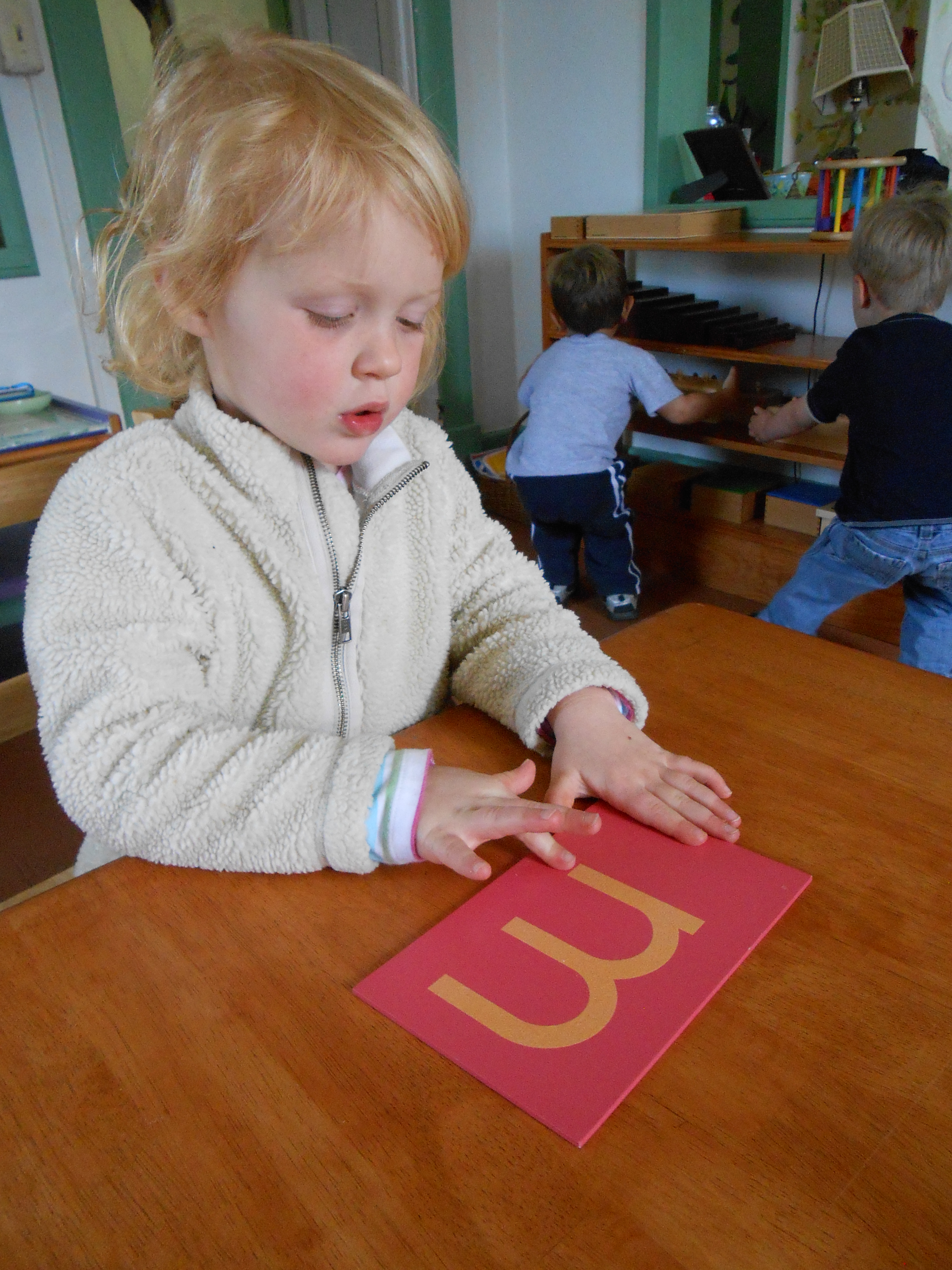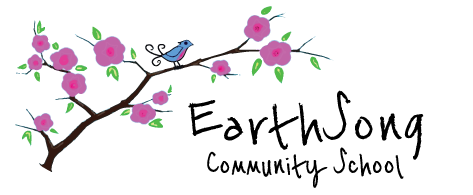Primary Program (children ages 2.5 – 6)
 Children between the ages of 3 and 6 are in a critical period of exploration. Much of what they encounter they are experiencing for the first time as they form their initial impressions of the world around them and learn the names of the things they encounter. At EarthSong our classroom is specifically designed to be inviting, engaging, and developmentally stimulating for our students.
Children between the ages of 3 and 6 are in a critical period of exploration. Much of what they encounter they are experiencing for the first time as they form their initial impressions of the world around them and learn the names of the things they encounter. At EarthSong our classroom is specifically designed to be inviting, engaging, and developmentally stimulating for our students.
The classroom is divided into seven major curriculum areas: language, math, science, geography/history/culture, practical life, sensorial, and art. The children are free to explore the curriculum throughout the work cycle, with guidance and support from their teachers. Children work with the materials both individually and in small groups. A typical day is a combination of working with teachers and freely choosing the work they enjoy.
Each child’s interests, abilities, and learning style are taken into account as the teacher’s guide her through the curriculum. Based on extensive observation and documentation the teachers guide each child’s experience, offering opportunities to explore the materials both through teacher directed lessons and independently.
Each area of the curriculum offers the students developmentally appropriate opportunities for intellectual, physical, and social growth. Following the Montessori method, the materials grow from very concrete, hands on manipulatives to those that are designed for the child to apply the more abstract understanding they have acquired. They are designed to provide the child with knowledge based on direct experience. They are designed to be used either independently or shared with others, instilling valuable lessons about the need to share, take turns, and compromise when working as a member of a community. And they provide ample opportunity to develop the fine motor skills the student will need to take on the more advanced academic tasks of writing letters and numbers.
The most foundational areas of the curriculum are the Practical Life and Sensorial areas. The materials in the Practical Life area help the child develop the skills he will need to take on basic tasks such as dressing, preparing simple snacks, sewing, wood working, and cleaning. At the same time they instill organizational skills, focus, and responsibility as the child encounters a task, prepares the materials he will need to successfully complete it, does the work, and follows through to complete the task by cleaning up his work and putting it back where it belongs. The Sensorial materials help the child develop organizational, critical thinking and problem solving skills as he learns to discriminate, organize and classify the information he receives from each of his five senses.
The Geography/History/Culture area of the curriculum provides the children with the opportunity to explore the similarities and differences with others who share this planet. They learn about the diversity of biomes, animals and people who inhabit each of the seven continents. Fridays are special days as the class works together to prepare special snacks based on recipes from the continent they are studying. Whenever possible we invite members of the community who have a special expertise about the people and culture of the continent to come in and share their experiences with us. We do our best to honor Dr. Montessori’s vision of a peaceful world built on understanding and acceptance of each other.
The Science curriculum is designed to facilitate the exploration of the foundational concepts in zoology, botany, geology, chemistry and physics. Children explore the differences between things that are living versus non-living, plants versus animals, magnetic versus non-magnetic. They learn to further distinguish things in terms of the five classes of vertebrates, rocks versus minerals, and the three states of matter. Underlying all of this exploration the child is developing her skills of attention to detail, critical thinking, and classification as she makes sense of the data she is working with.
The Language and Math curriculum help the child develop the basic skills he will need as the foundation for literacy and the basic operations of math. Children learn to recognize letters, the sound each one makes, and how to blend those sounds into words. They learn to recognize numbers, quantity, and place value, and how to manipulate numbers through addition, subtraction, multiplication and division. At the same time they are working with the manipulatives they are also working on writing letters and numbers so as to communicate what they are learning.
The Art curriculum provides the opportunity for students to explore their creativity through drawing, painting, collage, pottery, sculpture, music and theater. Our art teacher visits once a week to provide instruction in the various medium and the shelves are stocked with the materials the children need to repeat the work independently. The class prepares a holiday play each year and the children are free to create their own mini-plays with the puppet theater. We also celebrate the joy of music through our daily songfest to end the morning.
At this age children love to repeat activities that are interesting to them. They are driven to refine the skills they need to meet their needs independently and to explore the materials until they have uncovered all subtle lessons they have to teach. The work cycle provides the students with the time they need to explore the materials to their satisfaction. While enjoying the time they spend with beautifully designed and crafted materials, the youngest students develop remarkable concentration, fine motor skills and a rich vocabulary. These skills that are developed in the first two foundational years come to fruition as the third year, or kindergarden, students embrace the environment with the confidence, curiosity and abilities they need to master the works.
Their mastery of the materials and familiarity with the expectations of the environment prepare the kindergardeners to take on the role of community leaders. Their third year is as much about growing into an appropriate role model and leader as it is about academic growth. We empower the children to not only practice their skills in taking turns, sharing and compromising, but to teach these skills to their younger peers as well. We work to instill a sense of self- worth and respect for others that will inspire our students to practice “the Golden Rule” freely and independently.
Our Primary Program is designed to nurture a sense of self- worth and love of learning that will last a lifetime. By guiding and supporting our students as they develop the confidence and skills they will need to pursue their curiosity about the world and their place in it, we strive to make learning a rewarding and enriching experience. Our goal is to prepare our students to be successful learners and welcomed community members in whatever learning environment they find themselves in.
